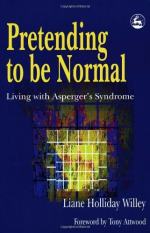
|
Introduction
1. Asperger's syndrome is a mild form of the condition known as _______. Individuals with this disorder, have various prognoses, but contribute greatly to society.
(a) Autism.
(b) Mutism.
(c) Artism.
(d) Sufism.
2. Individuals living with Asperger's syndrome may have all of the following issues except_______.
(a) Communicative challenges.
(b) Imaginative limitations.
(c) Migraines.
(d) Narrow interests.
3. Autism is understood as a _______ disease, because it most often arises during childhood.
(a) Immunological.
(b) Bacteriological.
(c) Developmental.
(d) Chemical.
4. All of the following researchers were involved in bringing Asperger's syndrome to the attention of the international community except______.
(a) Penny Dyer.
(b) Uta Frith.
(c) Tony Atwood.
(d) Lorna Wing.
5. Asperger's syndrome was first discussed by Hans Asperger in ______.
(a) 1954.
(b) 1944.
(c) 1964.
(d) 1974.
6. According to the book, each symptom of Asperger's syndrome is uniquely manifested and some individuals never receive _______.
(a) Benefits.
(b) A handicapped placard.
(c) Healthcare.
(d) A diagnosis.
7. Some individuals with Asperger's syndrome are thought to be ________ or have odd habits or mannerisms.
(a) Hypochondriacs.
(b) Epileptics.
(c) Asthmatics.
(d) Eccentrics.
(read all 180 Multiple Choice Questions and Answers)
|
This section contains 5,033 words (approx. 17 pages at 300 words per page) |

|




